Amazing weather today. Still walking. The part I most dislike about doing these many-day activity challenges is taking a photo. Here’s a photo of the sheets I use to track activity and goals.
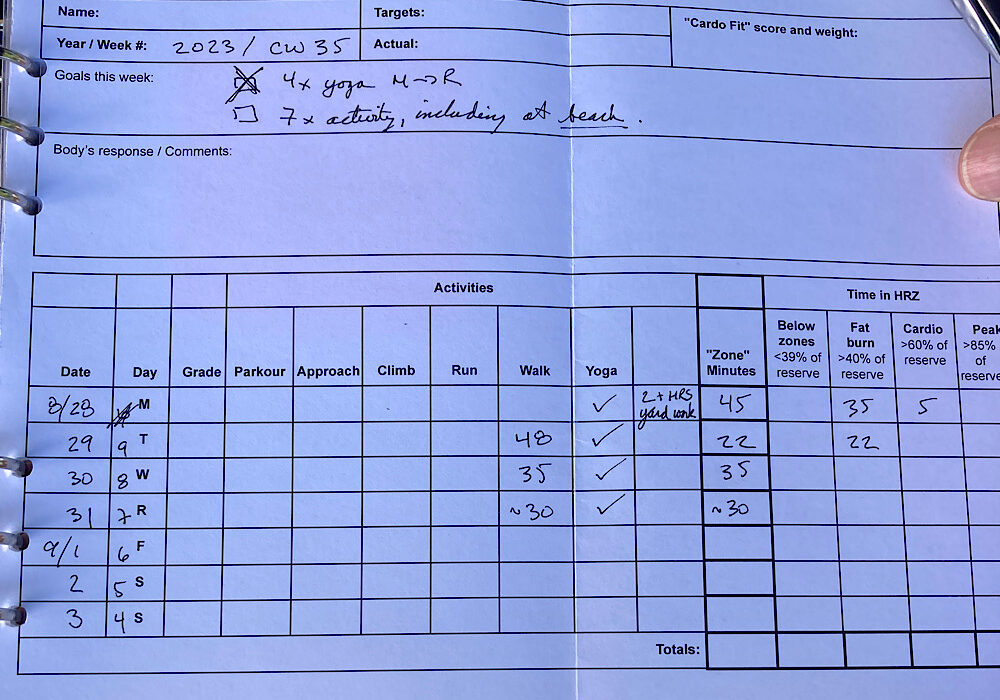

Amazing weather today. Still walking. The part I most dislike about doing these many-day activity challenges is taking a photo. Here’s a photo of the sheets I use to track activity and goals.
One of the most reliable signs that you need a holiday is the conviction that you cannot possibly spare the time to take one.
~ Bryan Magee
slip:4a1256.
What are the challenges and strategies for managing the technical, creative, and promotional aspects of podcasting effectively?
Audio engineers are adapting traditional skills to modern tools like Descript, reshaping collaboration in podcasting.
There’s a value in the creative work, there’s a value in the hard work, there’s a value in story, there’s all these values about doing the thing, but what do you think having it be published would add for you?
~ Mark Tweddle (17:57)
The conversation covers challenges in podcast production, focusing on integrating traditional audio engineering with modern collaborative tools like Descript. Descript’s transcription and editing features facilitated collaboration for a multi-host podcast, enabling efficient feedback and editing processes. The discussion also explored the creative synergy between music, storytelling, and podcasting, particularly through the unique production dynamics of live recordings and audience interactions.
Another major topic is the difficulty of balancing creative work with the practicalities of podcast promotion. Despite producing compelling content, finding the right audience and ensuring the podcast reaches them is a persistent challenge. Mark reflects on how personal values and satisfaction drive creative efforts, questioning what publishing adds to the creator’s sense of accomplishment.
Takeaways
Evolving role of tools — Collaborative podcast production and tools can streamline feedback and editing processes.
The challenges of transitioning from virtual to live podcast recordings — live shows demand different preparation and adaptability.
The importance of storytelling in various mediums — storytelling connects creators and audiences through shared narratives.
The intersection of music and podcasting — creative integration of music can enhance storytelling and audience engagement.
The difficulty of podcast discovery and audience targeting — even high-quality content may struggle to find its ideal listeners.
Balancing creative and technical demands — creators need to manage their time and energy effectively.
The role of pre-planning in podcasting — effective preparation ensures smoother production, particularly for live events.
Resources
Descript — A transcription and editing tool for podcasts and audio production.
Sauce Productions — Neil Harrington’s audio production company, specializing in podcasts and advertising.
Intimate Fame Podcast — A dramatized podcast focusing on historical figures; upcoming episodes explore Marilyn Monroe and Wallace Simpson.
Hindenburg Pro — Audio editing software for podcast production.
Edinburgh Festival — Venue for live podcast recordings discussed in the conversation.
(Written with help from Chat-GPT.)
ɕ
Philosophy isn’t a parlor trick or made for show. It’s not concerned with words, but with facts. It’s not employed for some pleasure before the day is spent, or to relieve the uneasiness of our leisure. It shapes and builds up the soul, it gives order to life, guides actions, shows what should and shouldn’t be done—it sits at the rudder steering our course as we vacillate in uncertainties. Without it, no one can live without fear or free from care. Countless things happen every hour that require advice, and such advise is to be sought out in philosophy.
~ Seneca
slip:4a994.
But then [Seneca] gives the real reason: “The body should be treated more rigorously that it may not be disobedient to the mind.” I think about that every morning just before I crank the knob. Who is in charge? The courageous side of me or the cowardly side? The side that doesn’t flinch at discomfort or the side that desires to always be comfortable? The side that does the hard thing or the side that takes the easy way?
~ Ryan Holiday from, You Actually Should Do Something That Scares You Every Day – RyanHoliday.net
slip:4urydo1.
This made me think. Usually, I share others’ writing because I thought highly of it. In this case, I’m hesitant to say this, however: I’ve never thought my body was in charge.
Certainly(!) I have reflexes and bodily functions or urges which my mind has no control over. Certainly flinching (under cold water for example) is something you can learn to reduce. I’ve always thought of my mind as the one who’s not always the best captain of the ship. I don’t need to train to put my mind in charge of my body.
Recently I hurt my back. The story begins with my doing some truly pathetic, free-weight exercises to strengthen my back. I over did it. Then I ate poorly and wound up bloated and a few pounds heavier. Then I went rock climbing and worked on a problem (a challenging combination of moves and skills, in an easy to access location rather than 2 hours up some mountain, so one can spend time with it) that involved maximum–strength pulling with my arms while pushing with my legs. Boink! Ow, my back. I managed to calmly pack my 20 pounds of things into my pack, walk back to the car and drive myself 3 hours home. There were a myriad of things that could have set me off in the moment, on the drive, and in the coming days: acute pain, inability to sleep well, the inability to reach my feet or wipe my butt, the fact that I did it all to myself while trying to improve my body, drivers on the highways and people who tried to talk to me, the overall setback, … so many things. But instead, I was reasonable with everyone. I did what I could do, rested and recovered. A week later—just as I knew I would be—I’m back to where I was before I picked up the free-weights. Ready to try again at improving myself (and planning an even more gradual start.)
So I’m inclined to say: My mind is clearly in charge, even under duress.
What I was thinking about, in that first sentence here, was if I have trained to put my mind in charge, that means there’s room for more training.
ɕ
When evening has come, I return to my house and go into my study. At the door I take off my clothes of the day, covered with mud and mire, and I put on my regal and courtly garments; and decently reclothed, I enter the ancient courts of ancient men, where, received by them lovingly, I feed on the food that alone is mine and that I was born for. There I am not ashamed to speak with them and to ask them the reasons for their actions; and they in their humanity reply to me. And for the space of four hours I feel no boredom, I forget every pain, I do not fear poverty, death does not frighten me. I deliver myself entirely to them.
~ Niccolò Machiavelli
slip:4a366.
Informed Simplicity is an enlightened view of reality. It is founded on ability to discern or create clarifying patterns with complex mixtures. Pattern recognition is a crucial skill for an architect, who must create a highly ordered building amid many competing and frequently nebulous design considerations.
~ Matthew Frederick from, Architect Matthew Frederick on the Three Levels of Knowing
slip:4ufote4.
As you’ve no doubt discovered, getting to the level of informed simpicity is difficult. It requires deep understanding of a field, and that requires significant time investment. In my opinion, a hallmarks of subject mastery is demonstrating a level of understanding that reaches informed simplicity.
If I think something is simple, either I’m a beginner or the subject isn’t complex enough to be a mastery practice. If I think something is complex, then I know I’m a beginner. And if when asked about the subject, I find myself looking up a little with my eyes, while making that lopsided, slight smile… suddenly lost in thought? Then I know things are getting easy.
ɕ
Twenty five years ago today [edit: August 25, 1995], Microsoft released Windows 95. It was undoubtedly a technical leap forward, but its biggest, most lasting impacts are about how it changed popular culture’s relationship to technology.
~ Anil Dash, from What Windows 95 Changed – Anil Dash
slip:4uaiwa2.
I had completely forgotten about Windows 95; I certainly never knew the specific date of its release. It certainly was a big deal at the time—not because I or the people I worked with used it, but because we were running an Internet Service Provider and our customers used it. So we had to know how to support it.
At the time we were in the midst of creating an “ezine.” It’s probably hard to explain how cutting edge this was—bear in mind that Wired started in ’93. (We had started publishing an online “magazine” in December ’94.) I’m bragging, sure, but also just trying to give you the context of the jaw-droppingly old web page I’m about to link you to.
Here’s my tongue-in-cheek article about drawing the short straw and having to go buy a copy of Windows 95 for our office: In a Plain Brown Wrapper, Please.
Granted, we moved that entire web site once when we sold the domain it was on along with the Internet Service Provider. But otherwise, those are literally, 25-year-old web pages.
ɕ
On the other hand, if you dump your trash in the forest to avoid paying the city’s garbage fees, or haggle endlessly with the manager at big-box store to get things for free, you’re not helping anyone but yourself. Canceling TV service and taking up the more productive hobby of reading library books is Frugal. Saving the same amount of money by voting down property tax funding for your local school system is Cheap.
~ Peter Adeney from, Frugal vs. Cheap
slip:4umofu1.
Even my title.
ɕ
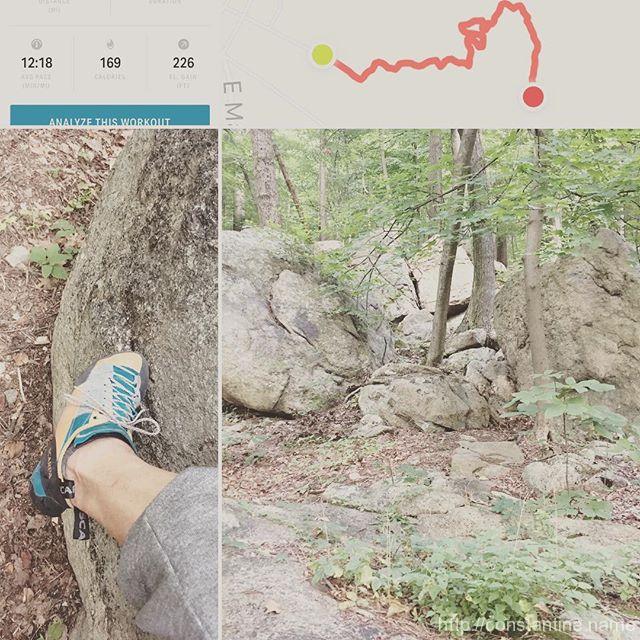
quick warm-UP run, then some fingers and toes conditioning. Possible rock climbing adventure in 18 days. #100days #artdudeplacement
ɕ
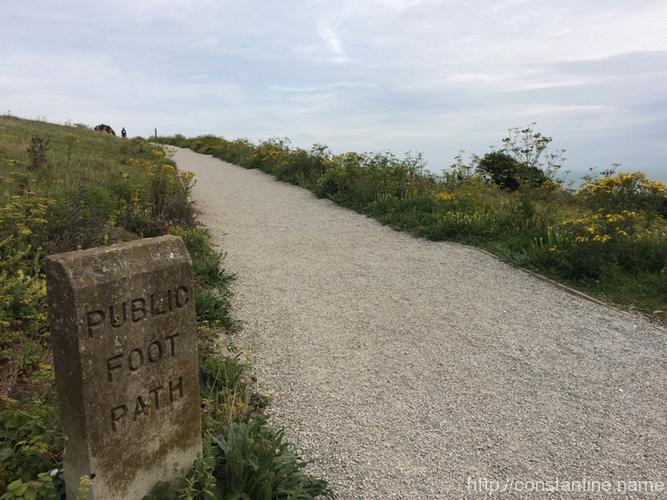
An album of the best photos from the Cliffs of Dover.
ɕ

This was all buried in snow last time I stood here. Now it’s a great night, with people walking their dogs etc.
ɕ

Allonze’y! (Is that correct? My French is pitiful.) Heading east into the night with a sped-up sunset. Our plane has not thrown a propeller; Interesting argument between the digital camera and the high-speed prop.
ɕ
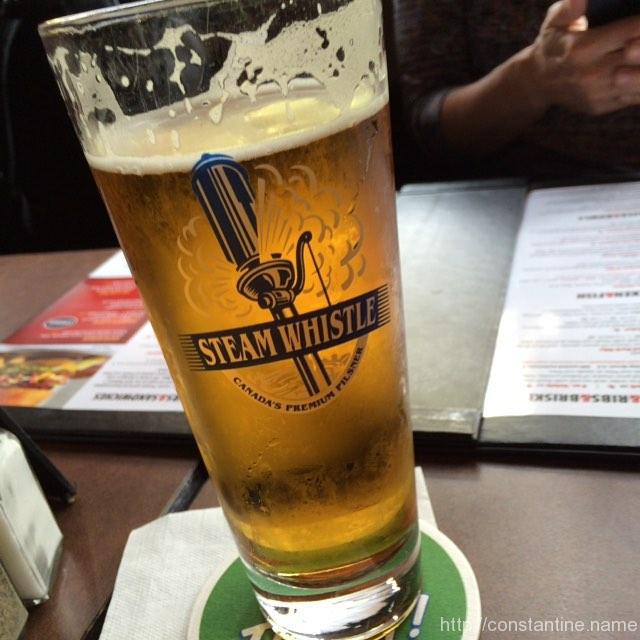
Late luch on Front street. Steam Whistle pilsner is delicious, eh!
ɕ
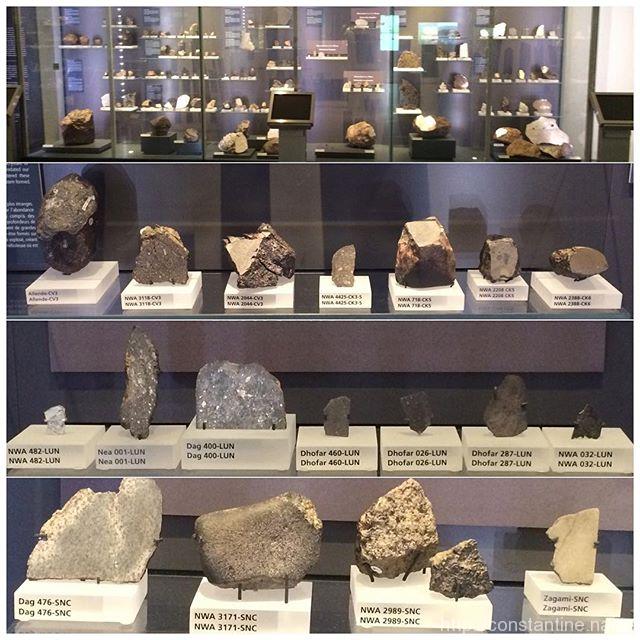
Meteorites. Middle two photos are Lunar and Martian collection. For the record, getting a trip of this rock is on my bucket list. (Matt, at #SpaceX, can you pick up the pace please ;)
ɕ
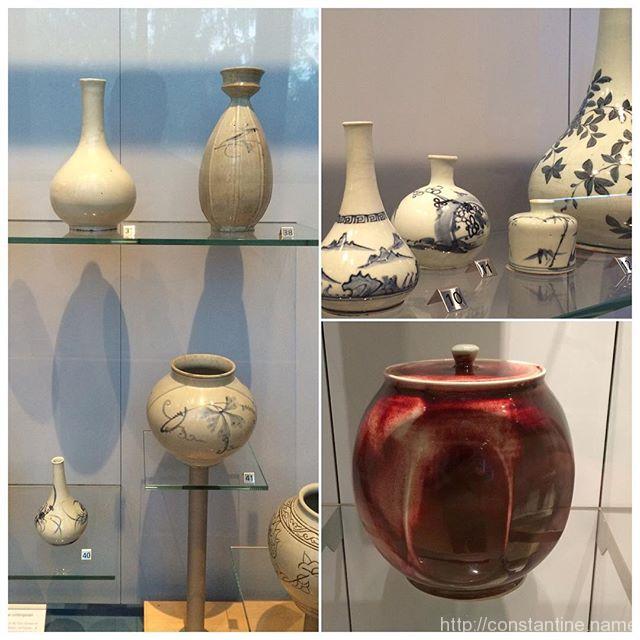
Beautifully decorated Korean pottery.
ɕ

Ming Dynasty. #ROM has a very impressive collection and very nicely displayed.
ɕ
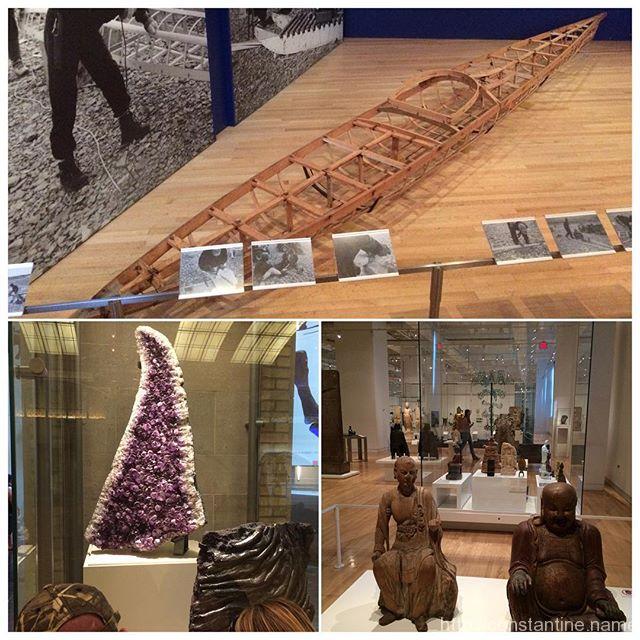
At the Royal Ontario Museum #ROM this morning!
ɕ
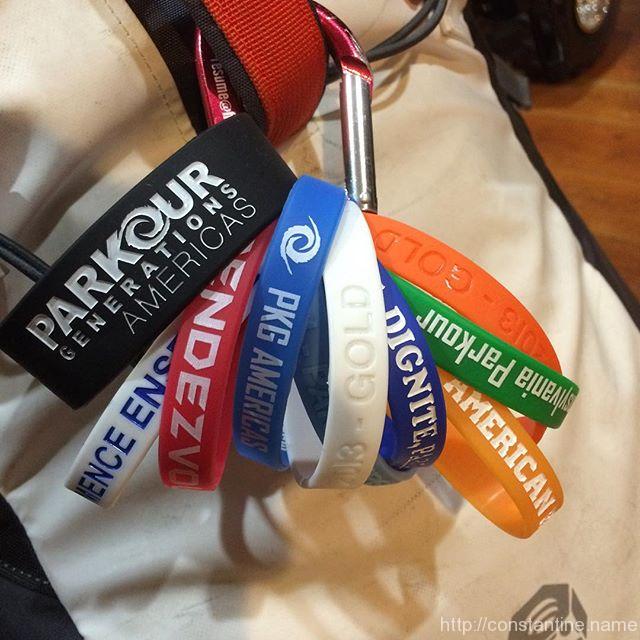
Great day training with everyone yesterday at the Toronto Community day. (But it’s really about the swag. ;) Off to the Royal Ontario Museum today.
ɕ
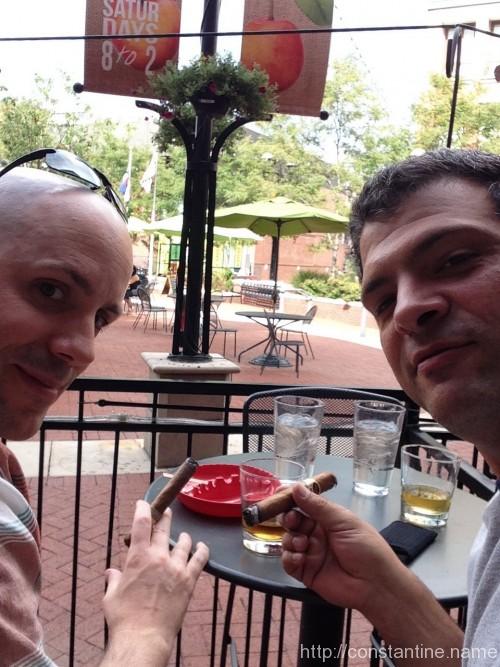
If we’d had any more fun, we’d have been arrested.
Mike drove up from Denver, and we headed up to Oskar Blues brew pub. We ordered two flights of their beer samples — ten delicious beers — and a kick *ss burger with arugula and a touch of honey. Da-YAM! …Mike knows how how to pick ’em.
Back story: Mike and I were in St. Martin back in 2001, and Mike introduced me to cigars — Cuban cigars to be exact. So I pulled up Yelp! and found Jonnie’s Cigars in downtown Boulder. We spent an hour or two working our way through two big, fat stogies, and several doubles (Glenmorangie and Stranahan’s) while people watching from the patio.
From there, we found our way to Pizzeria du Lupo. Mike ordered his favorite appetizer, and I suggested we send Summer a photo… “no! wait! dont tell her I ordered our favorite… ” <snap>

We rolled out of there, stuffed to the gills. And Mike says, “there’s one other place…”

What is this i dont even . . .
ɕ